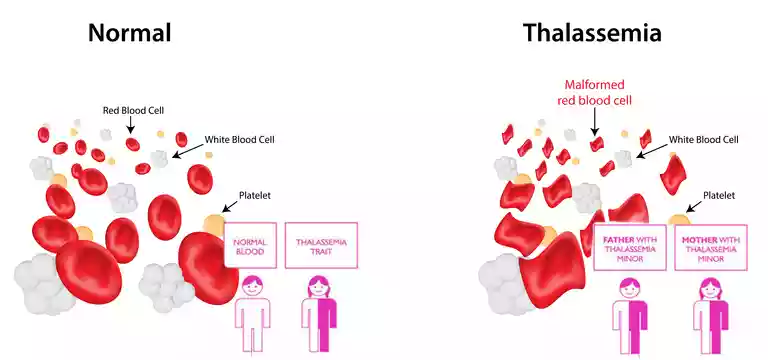
A blood test can be done at any time to find out about the thalassemia trait in your body and the risk to your child in India. This also leads to genetic disease, which can be treated after the thalassemia trait test.
A blood test can be done at any time to find out about the thalassemia trait in your body and the risk to your child in India. This also leads to genetic disease, which can be treated after the thalassemia trait test.
Having a thalassemia trait means you may not have any kind of symptom, but you might pass that trait on to your children, which can increase their risk of having thalassemia. It is actually passed from parents to their children through genetics and a blood disorder caused when the body doesn't make enough protein called haemoglobin, which is a core part of red blood cells. People with thalassemia can have mild or fever-like anaemia, which can also lead to reading. There are various kinds of alpha and beta, and this word describes how a saver is a person with trait thalassemia who actually does not have many symptoms. It can also be known as mild thalassemia, and a person with major thalassemia can have severe symptoms.
Treartment for thalassemia
People who have family members from certain parts of the world have a higher risk of thalassemia. It is very hard to prevent thalassemia because it passes from parents to their children. You can go for a consultation for thalassemia treatment so that it can be better treated.
Alpha thalassemia is actually a blood disorder in which haemoglobin production is reduced, which can lead to a reduction in haemoglobin, which is the score of red blood cells. It is important because it transports oxygen throughout the body, and in the case of its prediction, severe complications can be faced.
If you are suffering from the thalassemia trait, it means that your child can carry the same trait with themselves. In order to prevent this situation, you are required to consult with the doctor and just go for regular checkups to prevent it in your future generation.
Why we are so reliable?
We, the Ganesh Diagnostic and Imagine Centre, insure a reliable and affordable price for the Alpha thalassemia trade at a cost of Rs. 3000 only, but all that is ensured is the satisfaction of our patients. We always provide the best environment to our patients, we always provide a 24 and 7 ambulance service to avoid any kind of emergency situation, and we have updated technology for better and more accurate results. We also ensure health checkup availability at a reasonable price so that patients can avail our services. We have more than 30 lakh satisfied patients.
The thalassemia trait test is used to determine the presence of a thalassemia trait in a person.
Characteristics and uses of thalassemia characterization tests include:
Media detection: The main function of the thalassemia trait test is to identify individuals with thalassemia traits. Thalassemia is an inherited blood disorder caused by genetic mutations that affect hemoglobin production. A carrier of the thalassemia trait has one abnormal gene and one normal gene and usually has no symptoms of thalassemia itself. This test can help identify carriers of the thalassemia gene.
Genetic Counselling: Screening for thalassemia traits plays an important role in genetic counselling. If one or both parents carry the thalassemia trait, they are at risk of passing the thalassemia gene to their children. The test results provide information that allows genetic counsellors to assess the risk of having a child with thalassemia and provide appropriate advice on family planning and prenatal screening options.
Family planning: The Thalassemia Trait Test helps individuals and couples make informed decisions about family planning. Knowing your carrier status can help you understand the potential risk of delivering a baby with thalassemia. This allows you to discuss reproductive options such as prenatal testing and preimplantation genetic diagnosis (PGD) and consider alternatives such as adoption and gamete donors.
Population Screening: Tests for thalassemia characteristics are used in population screening programmes, particularly in areas with high thalassemia prevalence. Screening helps identify people with thalassemia traits in the community. Population screening programmes are designed to raise awareness, educate, and provide genetic counselling services to individuals and families living with thalassemia.
Health care: Screening for thalassemia features has implications for people's healthcare. Carriers of the thalassemia trait are generally asymptomatic or require no specific treatment, but knowledge of carrier status allows for appropriate medical follow-up.
This enables healthcare professionals to make informed decisions about other medical procedures, such as interpreting certain test results and avoiding unnecessary diagnostic testing.
Public Health Plan: Studying thalassemia characteristics provides valuable data for public health planning and resource allocation. This will help to estimate the prevalence of thalassemia traits in the population and to develop targeted prevention and control strategies. These include initiatives such as genetic counselling, awareness campaigns, and prenatal screening programmes. It should be noted that the screening tests for thalassemia features differed from the thalassemia diagnostic tests for people with thalassemia symptoms. Diagnostic tests include a more comprehensive analysis of haemoglobin levels, genetic mutations, and other relevant factors to confirm the presence of thalassemia and determine its specific type and severity.
This is how it is actually required to have thalassemia test for better diagnosis and treatment before it get severe.









